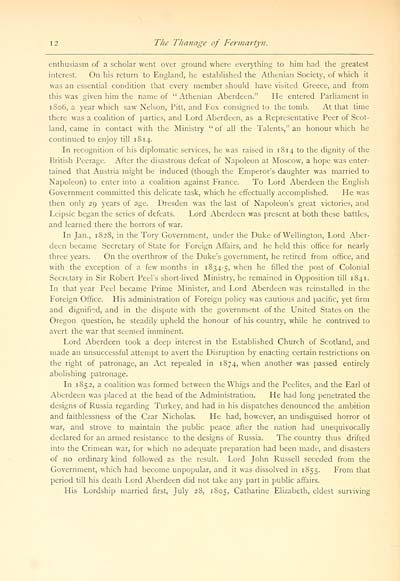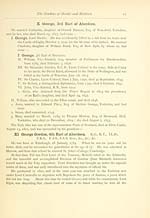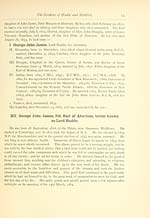New Spalding Club > Thanage of Fermartyn including the district commonly called Formartine
(34) Page 12
Download files
Complete book:
Individual page:
Thumbnail gallery: Grid view | List view

The Tlianage of Fertnartyti.
enthusiasm of a scholar went over ground where everything to him had the greatest
interest. On his return to England, he established the Athenian Society, of which it
was an essential condition that every member should have visited Greece, and from
this was given him the name of " Athenian Aberdeen." He entered Parliament in
1806, a year which saw Nelson, Pitt, and Fox consigned to the tomb. At that time
there was a coalition of parties, and Lord Aberdeen, as a Representative Peer of Scot-
land, came in contact with the Ministry " of all the Talents," an honour which he
continued to enjoy till 1S14.
In recognition of his diplomatic services, he was raised in 1814 to the dignity of the
British Peerage. After the disastrous defeat of Napoleon at Moscow, a hope was enter-
tained that Austria might be induced (though the Emperor's daughter was married to
Napoleon) to enter into a coalition against France. To Lord Aberdeen the English
Government committed this delicate task, which he effectually accomplished. He was
then only 29 years of age. Dresden was the last of Napoleon's great victories, and
Leipsic began the series of defeats. Lord Aberdeen was present at both these battles,
and learned there the horrors of war.
In Jan., 1828, in the Tory Government, under the Duke of Wellington, Lord Aber-
deen became Secretary of State for Foreign Affairs, and lie held this office for nearly
three years. On the overthrow of the Duke's government, he retired from office, and
with the exception of a few months in 1834-5, when he filled the post of Colonial
Secretary in Sir Robert Peel's short-lived Ministry, he remained in Opposition till 1841.
In that year Peel became Prime Minister, and Lord Aberdeen was reinstalled in the
Foreign Office. His administration of Foreign policy was cautious and pacific, yet firm
and dignified, and in the dispute with the government of the United States on the
Oregon question, he steadily upheld the honour of his country, while he contrived to
avert the war that seemed imminent.
Lord Aberdeen took a deep interest in the Established Church of Scotland, and
made an unsuccessful attempt to avert the Disruption by enacting certain restrictions on
the right of patronage, an Act repealed in 1874, when another was passed entirely
abolishing patronage.
In 1852, a coalition was formed between the Whigs and the Peelites, and the Earl of
Aberdeen was placed at the head of the Administration. He had long penetrated the
designs of Russia regarding Turkey, and had in his dispatches denounced the ambition
and faithlessness of the Czar Nicholas. He had, however, an undisguised horror of
war, and strove to maintain the public peace after the nation had unequivocally
declared for an armed resistance to the designs of Russia. The country thus drifted
into the Crimean war, for which no adequate preparation had been made, and disasters
of no ordinary kind followed as the result. Lord John Russell seceded from the
Government, which had become unpopular, and it was dissolved in 1855. From that
period till his death Lord Aberdeen did not take any part in public affairs.
His Lordship married first, July 28, 1805, Catharine Elizabeth, eldest surviving
enthusiasm of a scholar went over ground where everything to him had the greatest
interest. On his return to England, he established the Athenian Society, of which it
was an essential condition that every member should have visited Greece, and from
this was given him the name of " Athenian Aberdeen." He entered Parliament in
1806, a year which saw Nelson, Pitt, and Fox consigned to the tomb. At that time
there was a coalition of parties, and Lord Aberdeen, as a Representative Peer of Scot-
land, came in contact with the Ministry " of all the Talents," an honour which he
continued to enjoy till 1S14.
In recognition of his diplomatic services, he was raised in 1814 to the dignity of the
British Peerage. After the disastrous defeat of Napoleon at Moscow, a hope was enter-
tained that Austria might be induced (though the Emperor's daughter was married to
Napoleon) to enter into a coalition against France. To Lord Aberdeen the English
Government committed this delicate task, which he effectually accomplished. He was
then only 29 years of age. Dresden was the last of Napoleon's great victories, and
Leipsic began the series of defeats. Lord Aberdeen was present at both these battles,
and learned there the horrors of war.
In Jan., 1828, in the Tory Government, under the Duke of Wellington, Lord Aber-
deen became Secretary of State for Foreign Affairs, and lie held this office for nearly
three years. On the overthrow of the Duke's government, he retired from office, and
with the exception of a few months in 1834-5, when he filled the post of Colonial
Secretary in Sir Robert Peel's short-lived Ministry, he remained in Opposition till 1841.
In that year Peel became Prime Minister, and Lord Aberdeen was reinstalled in the
Foreign Office. His administration of Foreign policy was cautious and pacific, yet firm
and dignified, and in the dispute with the government of the United States on the
Oregon question, he steadily upheld the honour of his country, while he contrived to
avert the war that seemed imminent.
Lord Aberdeen took a deep interest in the Established Church of Scotland, and
made an unsuccessful attempt to avert the Disruption by enacting certain restrictions on
the right of patronage, an Act repealed in 1874, when another was passed entirely
abolishing patronage.
In 1852, a coalition was formed between the Whigs and the Peelites, and the Earl of
Aberdeen was placed at the head of the Administration. He had long penetrated the
designs of Russia regarding Turkey, and had in his dispatches denounced the ambition
and faithlessness of the Czar Nicholas. He had, however, an undisguised horror of
war, and strove to maintain the public peace after the nation had unequivocally
declared for an armed resistance to the designs of Russia. The country thus drifted
into the Crimean war, for which no adequate preparation had been made, and disasters
of no ordinary kind followed as the result. Lord John Russell seceded from the
Government, which had become unpopular, and it was dissolved in 1855. From that
period till his death Lord Aberdeen did not take any part in public affairs.
His Lordship married first, July 28, 1805, Catharine Elizabeth, eldest surviving
Set display mode to: Large image | Transcription
Images and transcriptions on this page, including medium image downloads, may be used under the Creative Commons Attribution 4.0 International Licence unless otherwise stated. ![]()
| Publications by Scottish clubs > New Spalding Club > Thanage of Fermartyn including the district commonly called Formartine > (34) Page 12 |
|---|
| Permanent URL | https://digital.nls.uk/82212898 |
|---|
| Description | Volumes 47-53 are uniform with but not part of the club's series. |
|---|---|

